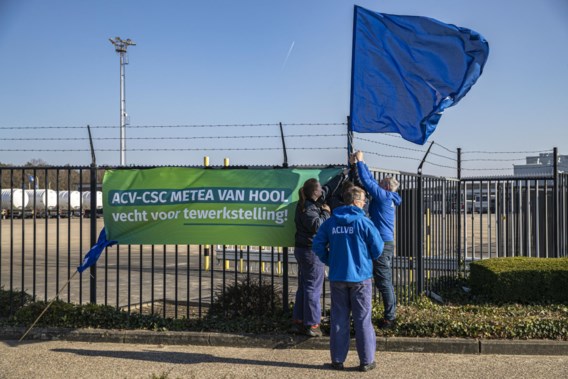“When I think about it for a moment, it’s actually really crazy.” In village café Jong Jut, in the center of Koningshooikt, 45-year-old Els looks around in wonder. “Just now a man suddenly sat next to me who I had never seen before, but who turned out to work at Van Hool. The café owner’s husband also works at Van Hool, as does my neighbor, and the neighbor two houses away. My husband has worked there for 17 years and I have been working there for 20 years now. You can’t look up and see that someone is working at Van Hool.”
With 2,400 employees, the bus builder – the last in Belgium – is by far the largest employer in the region. “Take numbers 2, 3 and 4 together and you don’t even get to the number of jobs that Van Hool offers,” says Mayor of Lier Rik Verwaest (N-VA). “More than half of the employees live less than a half-hour drive from the factory.” The news that Van Hool is moving its entire bus production to North Macedonia, which will result in the loss of hundreds of jobs, hits hard.
“Van Hool was ours,” says Verwaest. “I mean, it’s ours. Koningshooikt is Van Hool.” He means that literally. Take a satellite photo: the area of the factory sites is almost as large as the entire village center. Above almost every signpost to Koningshooikt there is also a signpost to Van Hool – often in faded letters, which highlights the age of the 77-year-old company.
“As a child I sat on Santa’s lap in this factory, now I fight for her survival,” says Kurt Christiaens (53). Together with colleagues from the liberal union, he hangs blue flags at the gates of the company premises where he has been visiting all his life. “My parents both worked here. My older sister worked here. I grew up with Van Hool. It was talked about all the time at home.”
Getting started in the company himself, immediately after finishing school, was an obvious choice. “That applied to many young people of my generation,” says Christiaens. “I knew from an early age that I would build buses when I grew up.”
Until a few years ago, the factory, which saw its workforce halved over the decades, offered job security for technically trained young people from the wider area. As a teacher at the Free Technical Institute in Lier, Luc Vingerhoets (56) went to the impressive factory halls with trainees. “They knew: at Van Hool they are always looking for people, we can always go there.”
Photos on Facebook
Those days are over, employees say, especially since the corona crisis. Many young people no longer join, or they leave quickly. The average age at Van Hool has grown to over 50. Careers lasting 30 or 40 years are not exceptional. Mayor Verwaest talks about a “lifelong employer”. “The pride is corresponding. If someone posts a photo of an old bus on Facebook, people fall over each other to say that they, their father or even grandfather still tinkered with that model.”
According to warehouseman Constantin Vioerel (56), who has 14 years at Van Hool, that pride has gone downhill in recent years. He stands in the spring sun in front of the factory gate, behind him the Belgian flag and that of North Macedonia flutter side by side in the wind. “We have seen for years that major investments no longer come to Koningshooikt, but go to Eastern Europe,” he says. “Especially since corona, it felt like an ending story to me. That weighed on the atmosphere.”
The demise of Van Hool is not only a blow to the employees, but has a broader impact, says Paul Wouters (65), café owner in Jong Jut and previously worked for the bus builder for 12 years. “The factory has brought a lot of prosperity to this village and the region,” he says. “For decades there was always work here, for anyone who wanted it. Good money was made here, and that money flowed. I, with my café, have also benefited from this, just like every trader in the area.” Wouters attributes the fact that this trend now appears to be reversing to government policy. “Due to the high labor costs, our country is too expensive for many companies. And then the Flemish government also buys its buses in China, instead of here from us. That is unforgivable.”
Like many here, Wouters hopes that the government can still bring salvation. If that does not work, there is a risk of deep dissatisfaction in this region. “If anyone abroad trips over a plank, they will be ready with millions of euros. They won’t abandon their own people now, will they?”
Packing boxes
Many employees at Van Hool felt times were changing, but few felt as directly as warehouse owner Els. The woman does not want her surname in the newspaper, so as not to upset the company that is her employer until further notice. “Since November I have seen more and more material being shipped to North Macedonia. Last week there was suddenly a lot of activity on our floor, with people we had never seen before coming to see our operations. That didn’t feel good.”
On Friday, the woman took home “everything with sentimental value” from her desk. “Who knows, maybe they won’t even let us in on Monday. I’m always optimistic, but today I feel resentment. I have worked at Van Hool for 20 years, my colleagues are family to me. Part of who I am is going to disappear.”
D-day for Van Hool staff
Monday morning at 9 o’clock it will most likely be announced at a special works council that some of the 2,500 jobs at Van Hool will be lost. A large part of production would move to North Macedonia. The intention would be to stop producing city buses and concentrate on coaches from now on. As a result, a dismissal procedure will probably be started on Monday via the Renault law.
It is expected that Van Hool will come up with a concrete plan for a restart of the healthy parts of the bus company. Every party involved, including politicians, will have to decide in the coming days how much money it wants to put on the table and under what conditions. The position of the banks in particular is becoming very important.
The Flemish government hopes for a restart of the factory in Koningshooikt, but any financial support will be temporary at best and linked to strict conditions. “We will not subsidize jobs in North Macedonia,” said the voice in Wetstraat. (nta)


